Bí kíp tự học Ielts từ con số 0 lên 8.0 - 2015
PHưƠNG PHÁP LUYỆN ĐỂ LÊN TRÌNH NGHE TIẾNG ANH NÓI CHUNG
Phương pháp luyện nghe hiệu quả nhất (đặc biệt với làm bài nghe trong kỳ thi IELTS) mà mình được biết
và đã áp dụng hiệu quả đó là NGHE VÀ CHÉP CHÍNH TẢ. Bạn nghe và chép chính tả lại 100% những
gì bạn nghe được. Bạn nên kết hợp luyện nghe và luyện pronounciation luôn (luyện nghe với nói bao giờ
cũng nên luyện song song). Cụ thể phương pháp này như sau:
+ Bước 1: tìm một nguồn phát tiếng Anh chuẩn (nói về chủ đề mà bạn thấy hứng thú) và phải có
phụ đề (nhất thiết phải có)
Dưới đây là một số nguồn mình đã nghe. Bạn nào biết nguồn nghe khác (lưu ý là có transcript) thì
comment vào đây để share cho mọi người cùng luyện tập nhé.
Lưu ý:Nếu bạn muốn luyện để thi IELTS là chính thì nên chọn nguồn nói giọng Anh –Anh để nghe.
Đang nghe quen giọng Anh-Mỹ đi thi IELTS toàn giọng Anh-Anh cũng khá mệt đấy vì một số từ người
Anh phát âm rất đặc trưng và rất khác với tiếng Anh Mỹ.
+ Bước 2 (giai đoạn đau khổ nhất ): Listen and transcribe it
Bạn nghe và chép lại tất cả những gì bạn nghe được. Bạn nghe 1 câu hoặc nếu không kịp thì nghe nửa
câu, pause, rồi chép lại. Có thể nghe đi nghe lại độ 3 lần rồi chuyển câu khác. Nghe được 6,7 câu thì
giở transcript ra so sánh.Đương nhiên là việc này sẽ rất khó, bạn sẽ mắc phải rất nhiều lỗi sai và không
nghe được nhiều từ (có thể là từ mới bạn chưa biết, hoặc từ bạn đã biết nhưng bạn lại phát âm sai -> nghe
sai). Hồi đầu thử transcribe “CNN student news”, mình sai toe toét. Không sao, kinh nghiệm ở đây của
mình là: cứ nghe, cứ viết ra tất cả những gì bạn nghe được (đoán được) rồi so sánh với transcript và rút
kinh nghiệm dần dần. Bạn sẽ tiến bộ nhanh hơn bạn nghĩ rất nhiều. Sau này, bạn sẽ thấy do phải chép
chỉnh tả 100%, những từ lúc nghe hay sót như “and” “the”, từ có số nhiều hay không bạn nghe sẽ rất rõ.
Và đến khi quay lại làm listening IELTS thì -> Easy as eating pancakes.
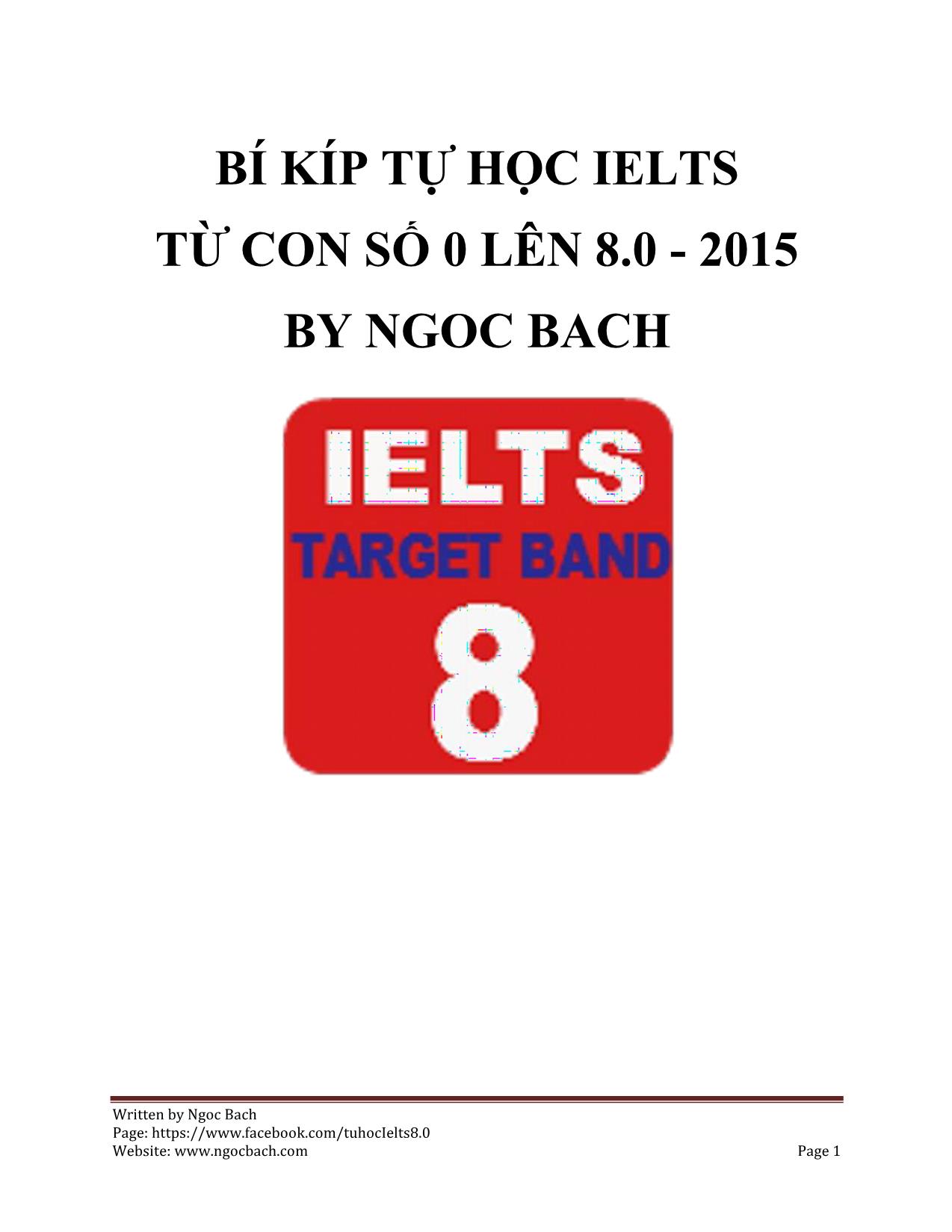
Trang 1
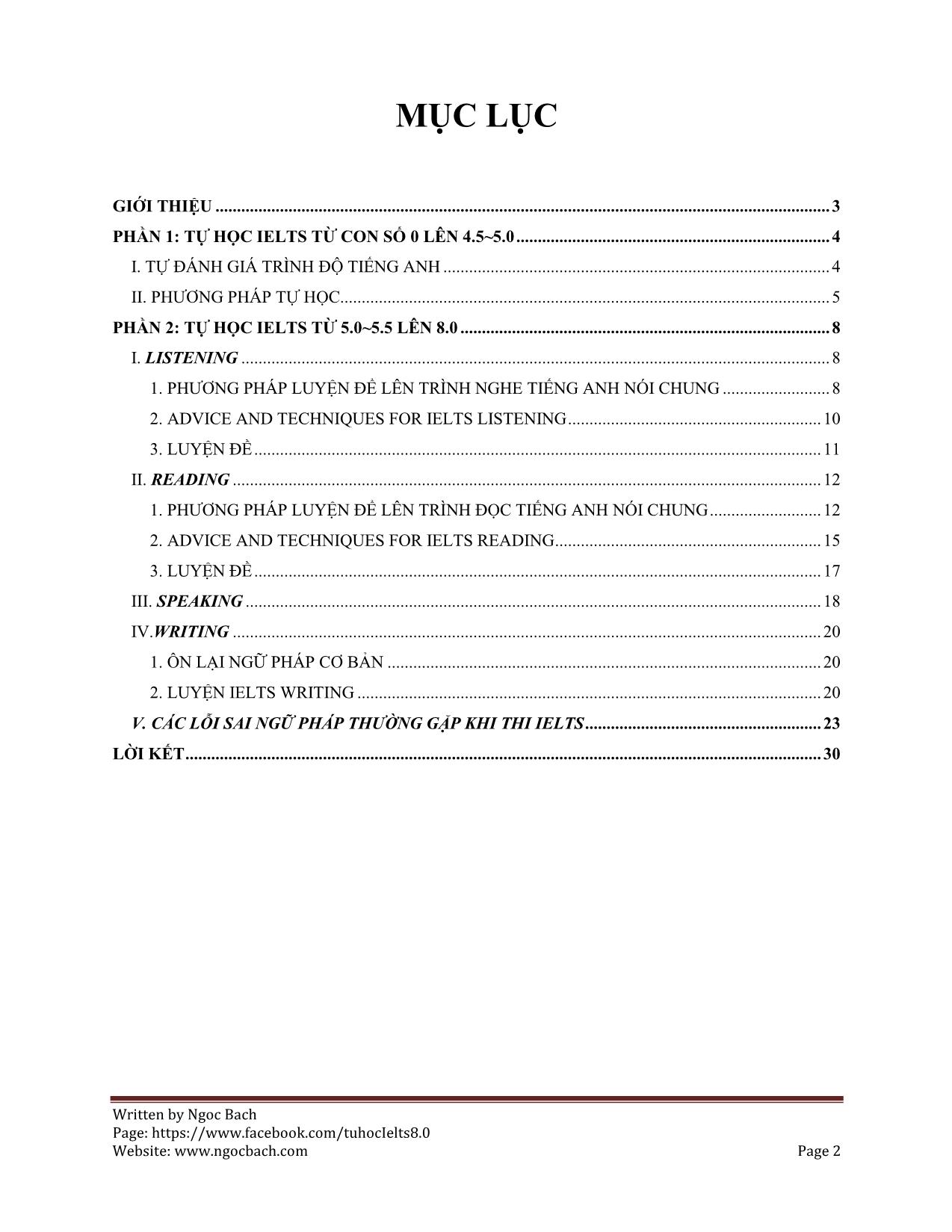
Trang 2
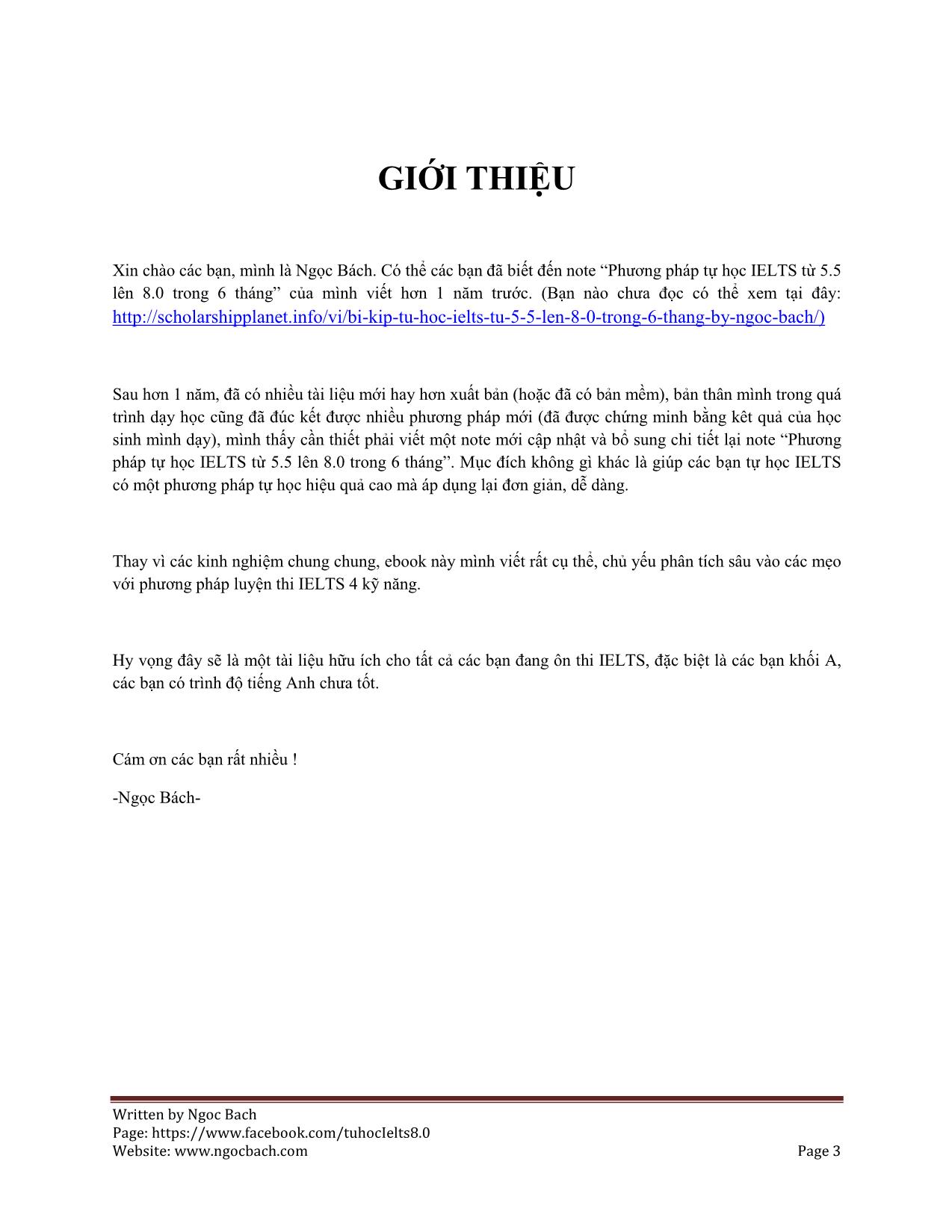
Trang 3
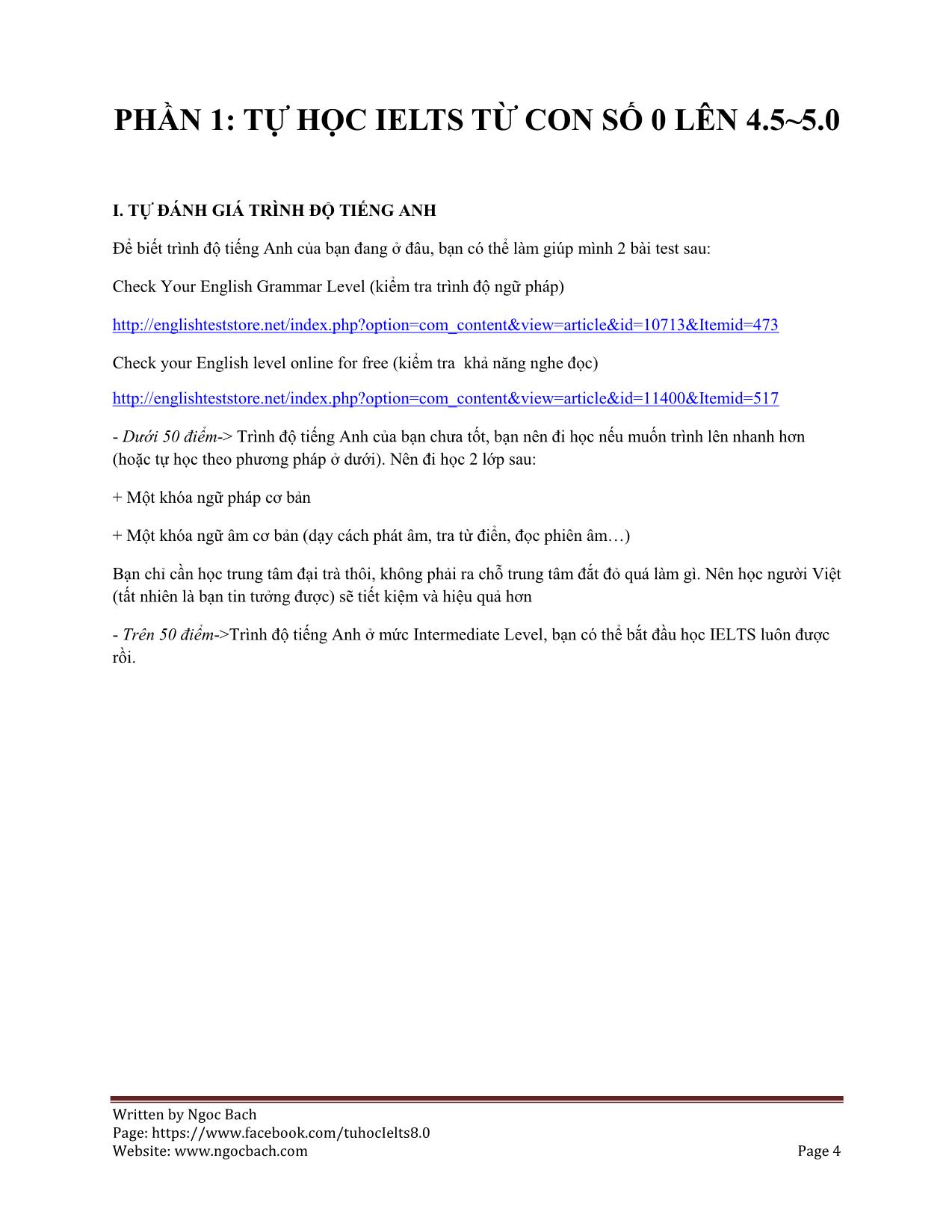
Trang 4
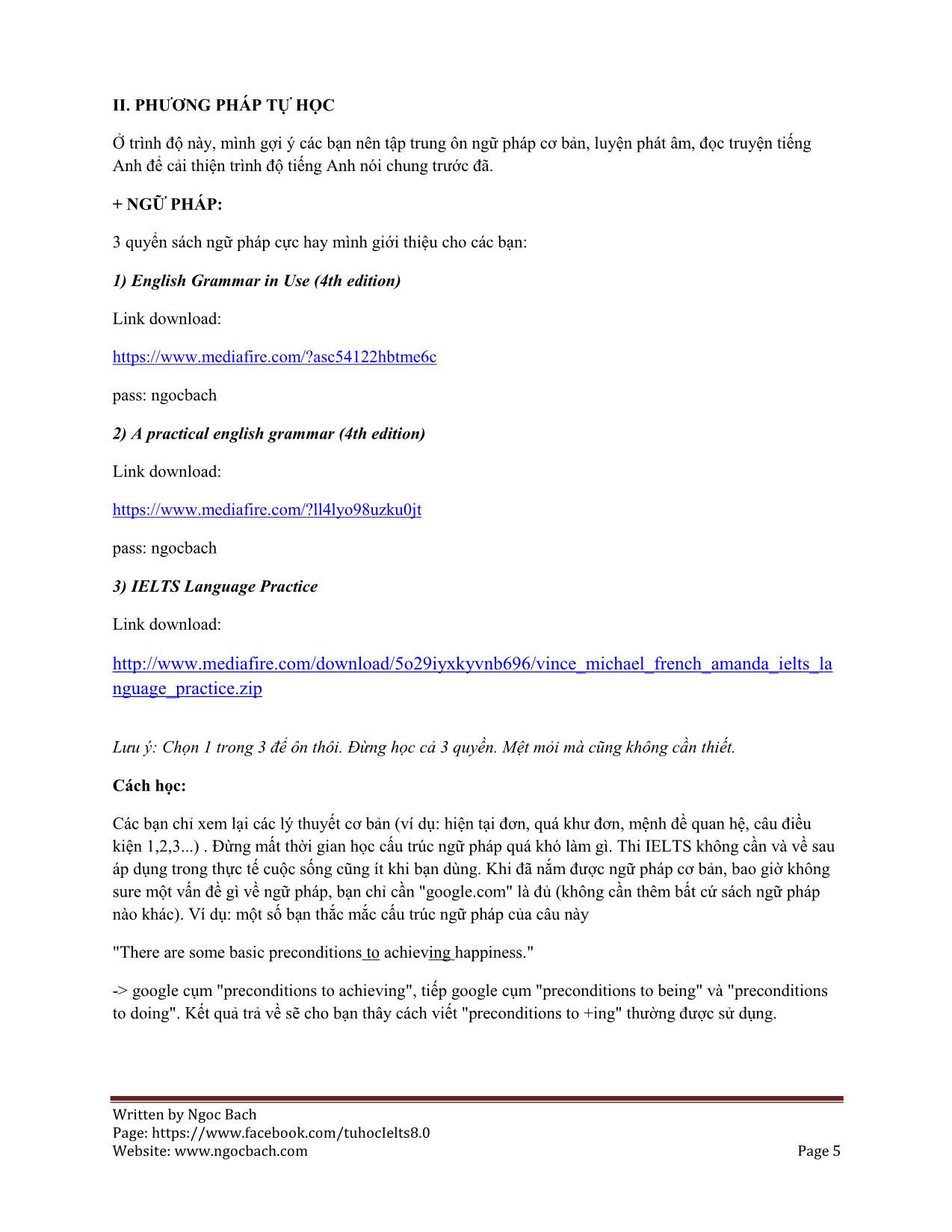
Trang 5
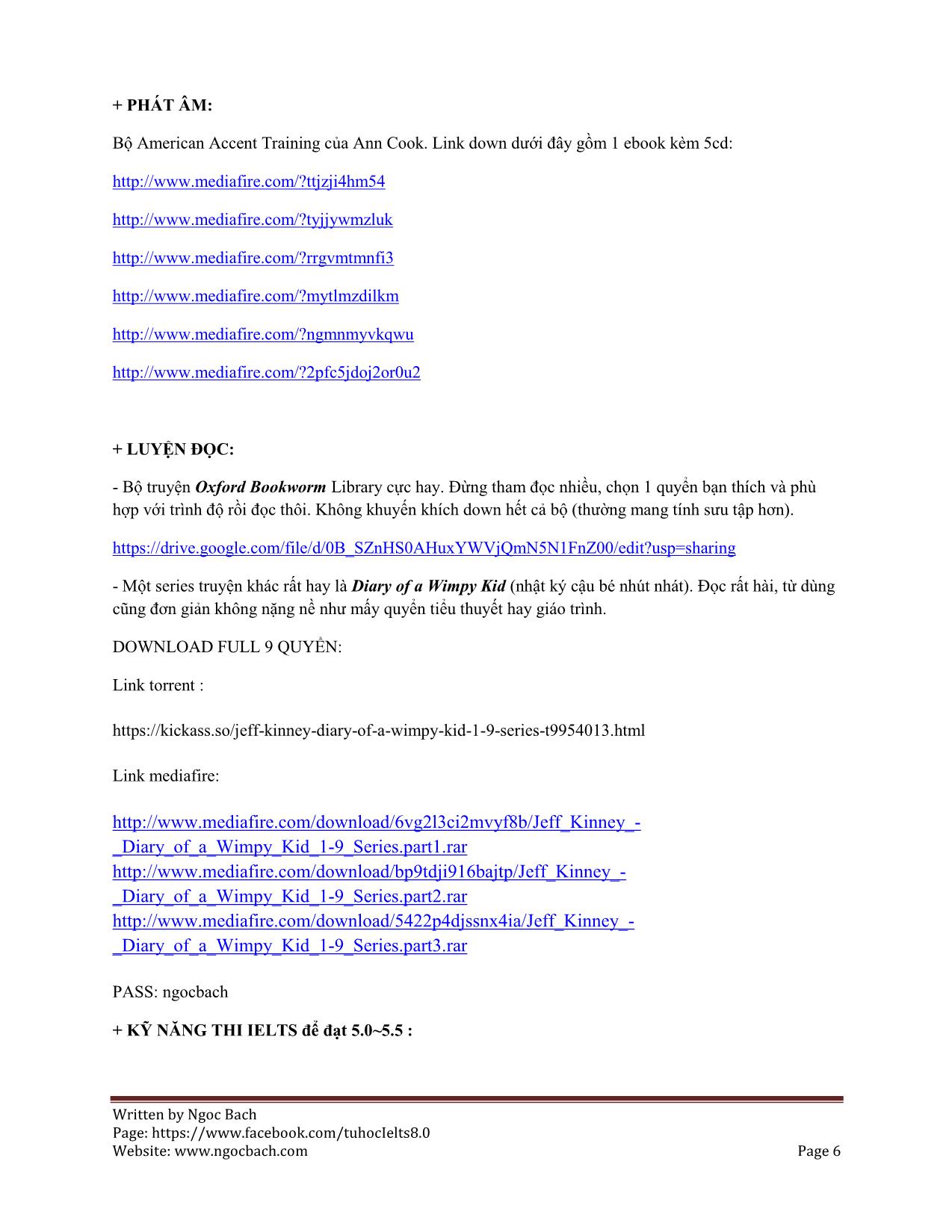
Trang 6
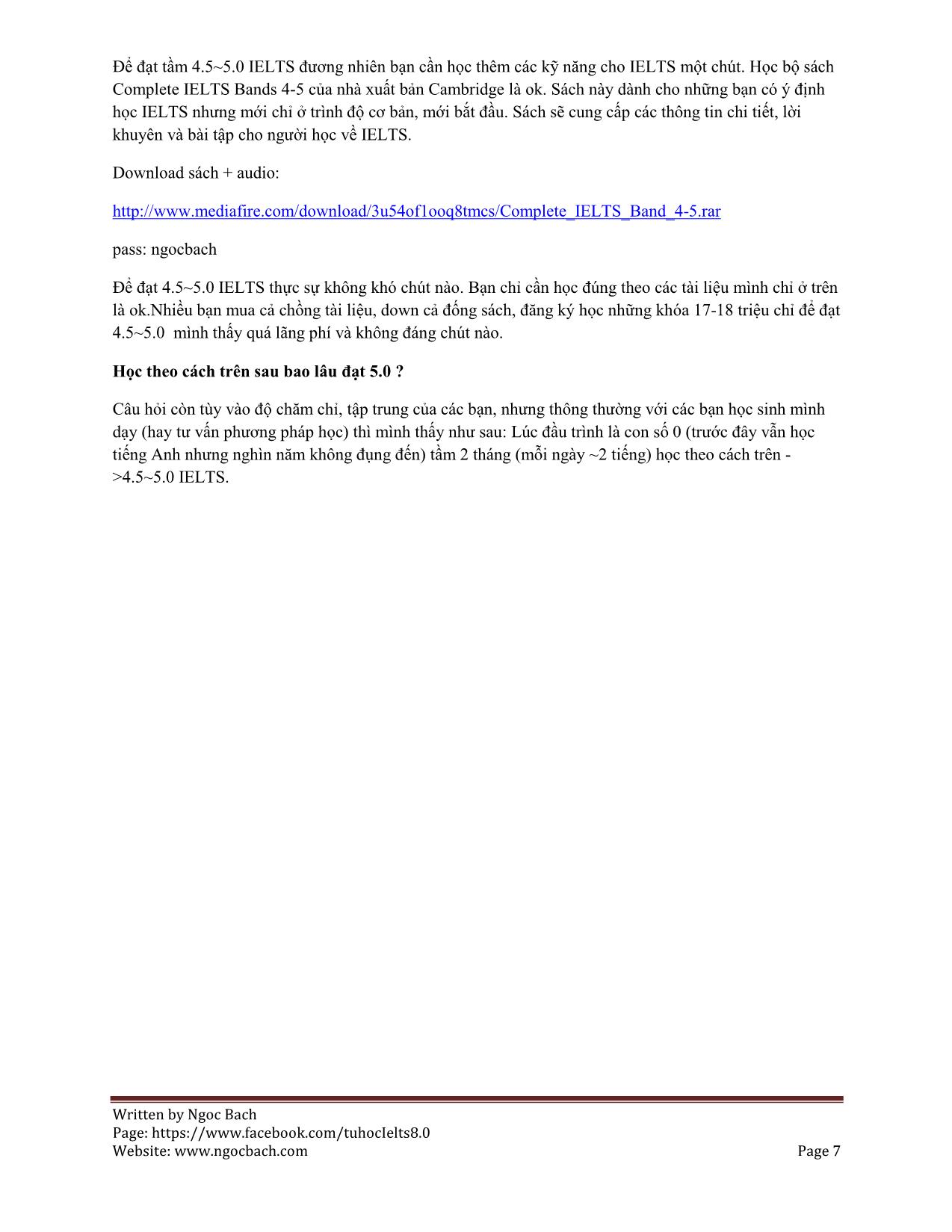
Trang 7
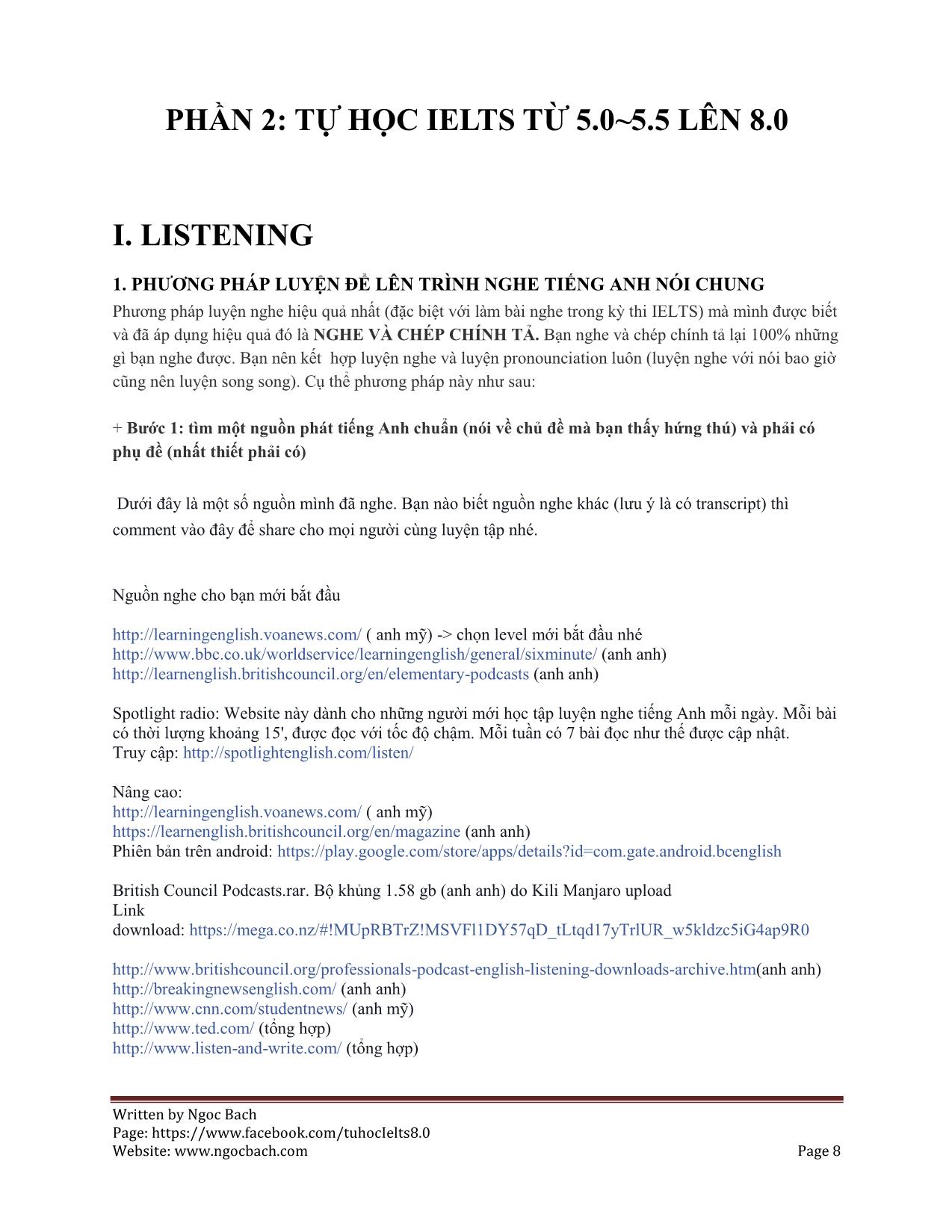
Trang 8
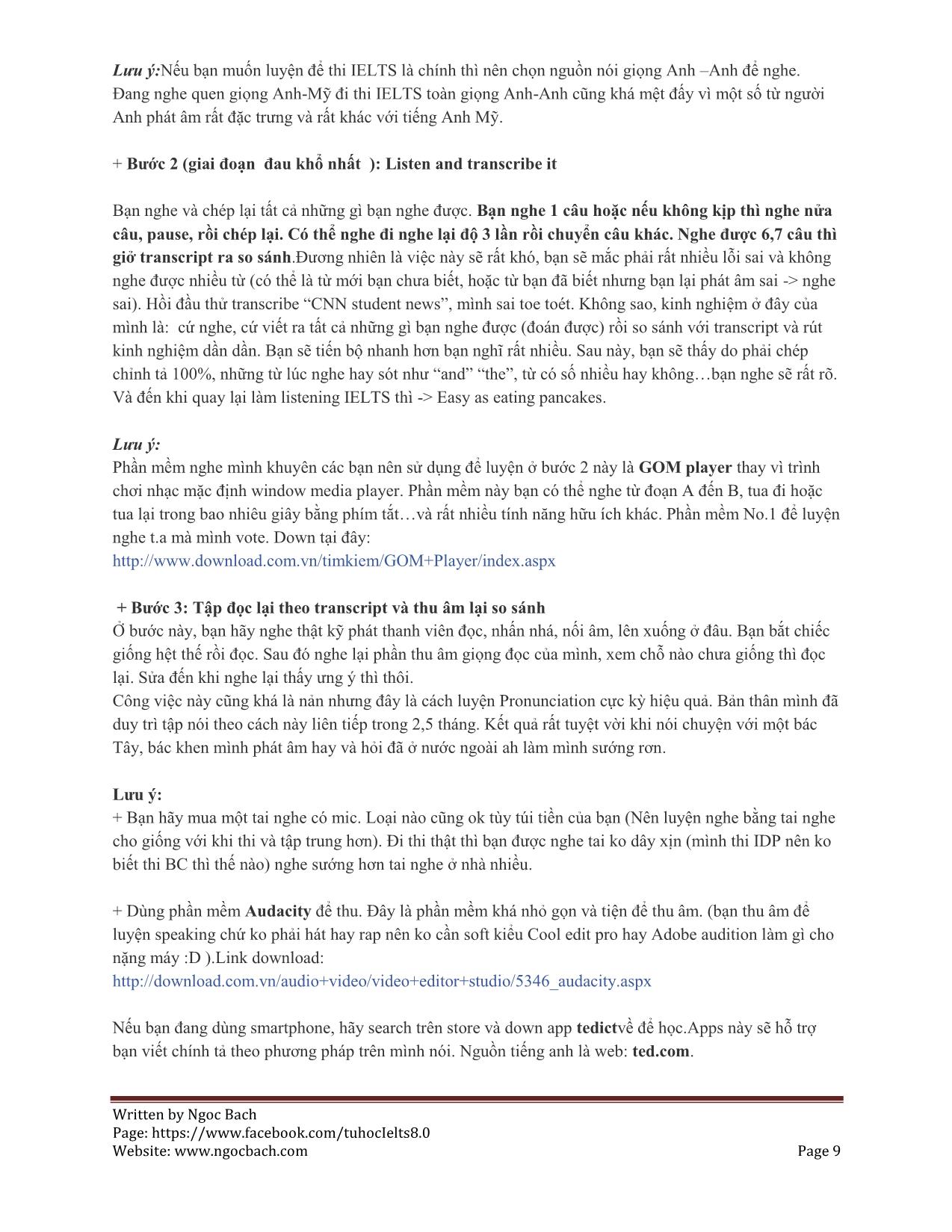
Trang 9
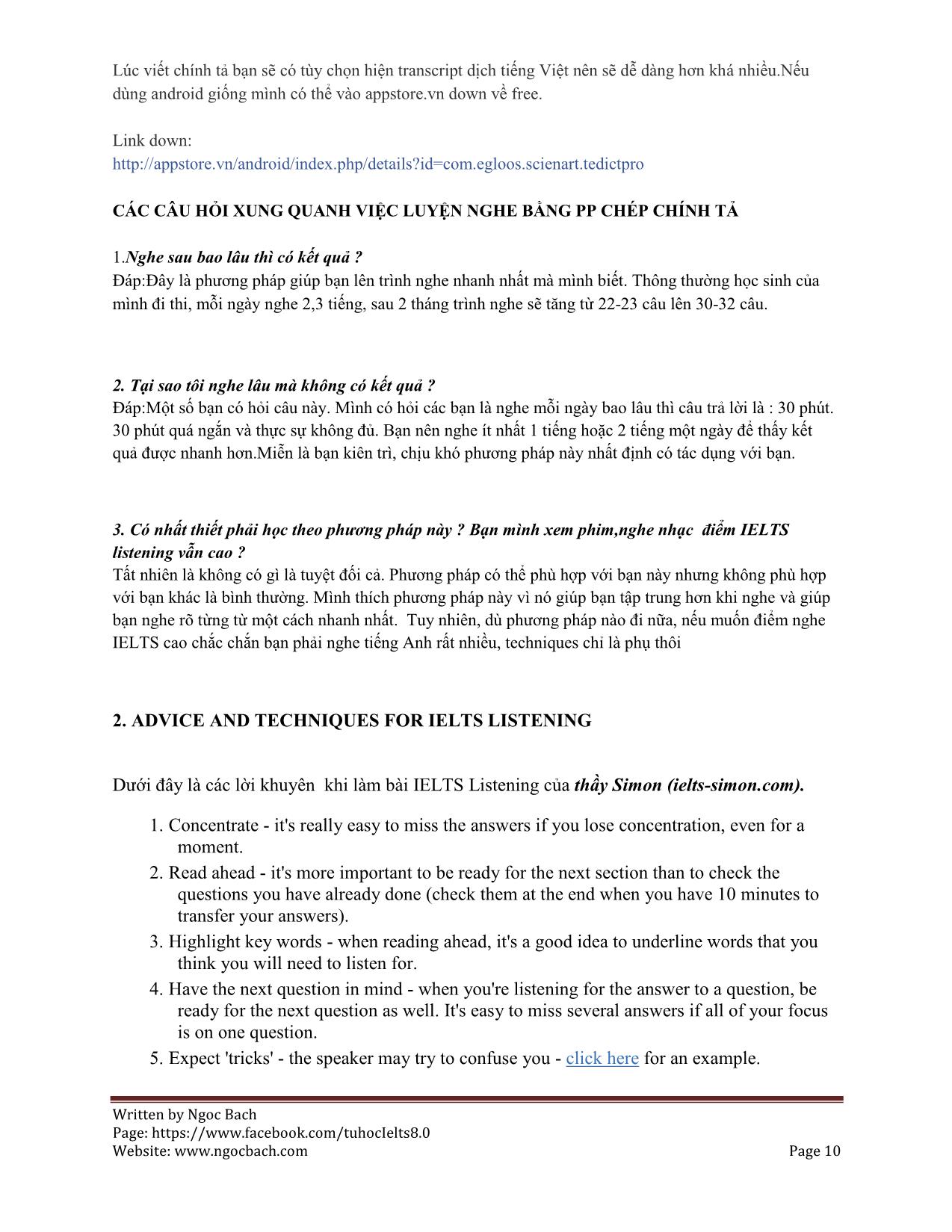
Trang 10
Tải về để xem bản đầy đủ
Tóm tắt nội dung tài liệu: Bí kíp tự học Ielts từ con số 0 lên 8.0 - 2015
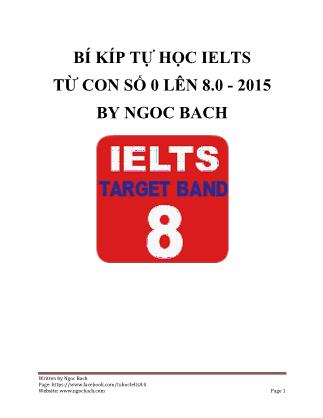
Written by Ngoc Bach
Page: https://www.facebook.com/tuhocIelts8.0
Website: www.ngocbach.com Page 1
BÍ KÍP TỰ HỌC IELTS
TỪ CON SỐ 0 LÊN 8.0 - 2015
BY NGOC BACH
Written by Ngoc Bach
Page: https://www.facebook.com/tuhocIelts8.0
Website: www.ngocbach.com Page 2
MỤC LỤC
GIỚI THIỆU ............................................................................................................................................... 3
PHẦN 1: TỰ HỌC IELTS TỪ CON SỐ 0 LÊN 4.5~5.0 ......................................................................... 4
I. TỰ ĐÁNH GIÁ TRÌNH ĐỘ TIẾNG ANH .......................................................................................... 4
II. PHƢƠNG PHÁP TỰ HỌC.................................................................................................................. 5
PHẦN 2: TỰ HỌC IELTS TỪ 5.0~5.5 LÊN 8.0 ...................................................................................... 8
I. LISTENING ......................................................................................................................................... 8
1. PHƢƠNG PHÁP LUYỆN ĐỂ LÊN TRÌNH NGHE TIẾNG ANH NÓI CHUNG ......................... 8
2. ADVICE AND TECHNIQUES FOR IELTS LISTENING ........................................................... 10
3. LUYỆN ĐỀ .................................................................................................................................... 11
II. READING ......................................................................................................................................... 12
1. PHƢƠNG PHÁP LUYỆN ĐỂ LÊN TRÌNH ĐỌC TIẾNG ANH NÓI CHUNG .......................... 12
2. ADVICE AND TECHNIQUES FOR IELTS READING .............................................................. 15
3. LUYỆN ĐỀ .................................................................................................................................... 17
III. SPEAKING ...................................................................................................................................... 18
IV.WRITING ......................................................................................................................................... 20
1. ÔN LẠI NGỮ PHÁP CƠ BẢN ..................................................................................................... 20
2. LUYỆN IELTS WRITING ............................................................................................................ 20
V. CÁC LỖI SAI NGỮ PHÁP THƯỜNG GẶP KHI THI IELTS ....................................................... 23
LỜI KẾT .................................................................................................................................................... 30
Written by Ngoc Bach
Page: https://www.facebook.com/tuhocIelts8.0
Website: www.ngocbach.com Page 3
GIỚI THIỆU
Xin chào các bạn, mình là Ngọc Bách. Có thể các bạn đã biết đến note “Phƣơng pháp tự học IELTS từ 5.5
lên 8.0 trong 6 tháng” của mình viết hơn 1 năm trƣớc. (Bạn nào chƣa đọc có thể xem tại đây:
Sau hơn 1 năm, đã có nhiều tài liệu mới hay hơn xuất bản (hoặc đã có bản mềm), bản thân mình trong quá
trình dạy học cũng đã đúc kết đƣợc nhiều phƣơng pháp mới (đã đƣợc chứng minh bằng kêt quả của học
sinh mình dạy), mình thấy cần thiết phải viết một note mới cập nhật và bổ sung chi tiết lại note “Phƣơng
pháp tự học IELTS từ 5.5 lên 8.0 trong 6 tháng”. Mục đích không gì khác là giúp các bạn tự học IELTS
có một phƣơng pháp tự học hiệu quả cao mà áp dụng lại đơn giản, dễ dàng.
Thay vì các kinh nghiệm chung chung, ebook này mình viết rất cụ thể, chủ yếu phân tích sâu vào các mẹo
với phƣơng pháp luyện thi IELTS 4 kỹ năng.
Hy vọng đây sẽ là một tài liệu hữu ích cho tất cả các bạn đang ôn thi IELTS, đặc biệt là các bạn khối A,
các bạn có trình độ tiếng Anh chƣa tốt.
Cám ơn các bạn rất nhiều !
-Ngọc Bách-
Written by Ngoc Bach
Page: https://www.facebook.com/tuhocIelts8.0
Website: www.ngocbach.com Page 4
PHẦN 1: TỰ HỌC IELTS TỪ CON SỐ 0 LÊN 4.5~5.0
I. TỰ ĐÁNH GIÁ TRÌNH ĐỘ TIẾNG ANH
Để biết trình độ tiếng Anh của bạn đang ở đâu, bạn có thể làm giúp mình 2 bài test sau:
Check Your English Grammar Level (kiểm tra trình độ ngữ pháp)
Check your English level online for free (kiểm tra khả năng nghe đọc)
- Dưới 50 điểm-> Trình độ tiếng Anh của bạn chƣa tốt, bạn nên đi học nếu muốn trình lên nhanh hơn
(hoặc tự học theo phƣơng pháp ở dƣới). Nên đi học 2 lớp sau:
+ Một khóa ngữ pháp cơ bản
+ Một khóa ngữ âm cơ bản (dạy cách phát âm, tra từ điển, đọc phiên âm)
Bạn chỉ cần học trung tâm đại trà thôi, không phải ra chỗ trung tâm đắt đỏ quá làm gì. Nên học ngƣời Việt
(tất nhiên là bạn tin tƣởng đƣợc) sẽ tiết kiệm và hiệu quả hơn
- Trên 50 điểm->Trình độ tiếng Anh ở mức Intermediate Level, bạn có thể bắt đầu học IELTS luôn đƣợc
rồi.
Written by Ngoc Bach
Page: https://www.facebook.com/tu ... các bài mẫu tip, task 1 của Simon
https://www.mediafire.com/?bwwgpmn68c3kcls
Tổng hợp các bài mẫu task 2 của Simon
3. Chữa IELTS Writing
Vấn đề muôn thuở của luyện viết. Có mấy cách sau:
Thứ nhất, các bạn có thể tự sửa cho mình. Các bạn có thể xem các video dạy IELTS Writing của mình,
xem các bài ví dụ mình phân tích 4 tiêu chí chấm thi thế nào, nghiền ngẫm thật kỹ -> tự chữa cho mình.
https://www.youtube.com/user/ngocbach2014/feed
Written by Ngoc Bach
Page: https://www.facebook.com/tuhocIelts8.0
Website: www.ngocbach.com Page 22
Ví dụ: Hôm nay bạn viết 1 bài task 1, 1 bài task 2. Sau đó, ngày kia bạn giở ra check lại tự sửa lỗi cho
mình -> chắc chắn các bạn sẽ nhận ra rất nhiều lỗi bạn gặp phải lúc viết
Thứ hai, các bạn có thể sử dụng dịch vụ correct essay giá rẻ của ngƣời nƣớc ngoài nhƣ:
(Khoảng 50k/1 bài nếu chữa 8 bài)
Thứ ba, chữa cho nhau. Group đang thực hiện hoạt động này khá hiệu quả là group “Hội luyện thi IELTS
trên scholarshipplanet. Bạn xem link ở đây:
Luyện IELTS WRITING bằng 3 nguồn trên -> đã đủ để bạn đạt Writing lên tầm 6.5~7.5.
Written by Ngoc Bach
Page: https://www.facebook.com/tuhocIelts8.0
Website: www.ngocbach.com Page 23
V. CÁC LỖI SAI NGỮ PHÁP THƢỜNG GẶP KHI
THI IELTS
Đây là các vấn đề ngữ pháp thƣờng gặp đã đƣợc thầy Simon nhắc đến trên trang ielts-simon.com. Các lỗi
này mình để ý các bạn học sinh khi thi IELTS mắc thƣờng xuyên. Xem phần chữa của thầy Simon dƣới
đây chắc chắn mọi ngƣời sẽ học hỏi, rút kinh nghiệm đƣợc rất nhiều
Mình cũng đang tổng kết 1 file các lỗi thƣờng gặp của học sinh trong quá trình chữa bài. Dự kiến sẽ post
trong thời gian tới. Trƣớc mắt mọi ngƣời cứ tham khảo file này đã nhé. Tâm lý chung của mọi ngƣời là
cái gì cũng thích "FULL", down về cho đầy máy :)). Vấn đề là down về xong toàn để đấy nên hiệu quả
không đƣợc mấy. Học tiếng anh nên học từ từ, tích lũy mỗi ngày một ít. :D
IELTS Grammar: some typical mistakes
Find 5 common mistakes in the paragraph below:
Some people believe that, all police officers should carry a gun. While, others disagree with this idea, and
argue that it is intimidating to see armed police officers on the streets. From my view, the advantages of
police officers carrying guns have overweighed the disadvantages. Because the police need to be able to
protect both themselves and the general public.
Feel free to share your answers in the "comments" area below. I'll reveal the correct answers tomorrow.
CORRECT ANSWERS:
1. 'Some people believe that all...' (no comma after "that")
2. '... should carry a gun, while...' (don't begin a sentence with "While," - use "while" after a comma to
link contrasting ideas in the same sentence)
3. 'In my view' OR 'From my point of view' (not "From my view")
4. 'the advantages of police officers carrying guns OUTWEIGH the disadvantages' ("outweigh" NOT
"have overweighed")
5. '... the disadvantages because...' ("because" is used to connect ideas in the SAME sentence. You don't
need a comma before "because")
Good work Hana, Felora and Evan
Simon
IELTS Grammar: before or ago?
Written by Ngoc Bach
Page: https://www.facebook.com/tuhocIelts8.0
Website: www.ngocbach.com Page 24
Don't say: I came to Manchester before two weeks.
Do say: I came to Manchester two weeks ago.
Use "past time + ago"
10 years ago, a long time ago, a few weeks ago, a couple of days ago
Use "before + action / event"
before you left, before we start, before lunch
Don't use "before + past time" (before two weeks, before three days)
IELTS Grammar: fall or reduce?
These two words are the opposites of 'rise' and 'raise' (see last week's grammar lesson):
something falls (e.g. the price fell)
somebody reduces something (e.g. the company reduced the price)
You will probably use 'fall' to describe numbers on a graph or chart for IELTS Writing Task 1:
In 2008, the number of customers fell. (verb, past)
There was a sharp fall in Internet usage. (noun)
'Reduce' and 'reduction' are probably more useful for Writing Task 2:
We need to reduce the amount of pollution from exhaust fumes. (verb)
Recycling leads to a reduction in waste. (noun)
IELTS Grammar: linking with "this"
All students learn to link ideas using words like "however", "furthermore" etc. Most students don't realise
that the word "this" is also a linking word. Look at the following examples:
Nowadays, people can use the Internet, fax and mobile phones to work from home. In this way,
people who do not have access to transport can find employment.
Most products are built to last only a short time, and this creates a "throw-away" culture.
A global economy means free trade between countries. This can strengthen political
relationships.
The word "this" refers to the sentence or idea that came before. "This" helps you to link ideas and avoid
repetition. Native speakers and good writers use "this" a lot, and the IELTS examiner will be impressed if
you can use it.
IELTS Grammar: because
Students often make mistakes when using the word "because". You can't use "because" to connect ideas
in two separate sentences. Put both the main idea and the reason in the same sentence.
Written by Ngoc Bach
Page: https://www.facebook.com/tuhocIelts8.0
Website: www.ngocbach.com Page 25
Which sentence is NOT correct?
1. Some children behave badly at school because their parents are too lenient at home.
2. Because parents are often too lenient at home, discipline in schools is becoming more difficult
to enforce.
3. Children's behaviour is getting worse nowadays. Because parents are not strict enough.
CORRECT ANSWER:
Sentence 3 is NOT correct. 1 and 2 are fine.
...
Chutarrat,
You can use "Firstly,..." or "First,..." I normally use "Firstly" but it's find to use "First".
All the best
Simon
Posted by: SImon | Monday, October 18, 2010 at 16:27
CORRECT ANSWER CONTINUED...
Sentence 3 should be written as one sentence with no stop or comma:
"Children's behaviour is getting worse nowadays because parents are not strict enough".
Simon
Posted by: SImon | Monday, October 18, 2010 at 16
IELTS Grammar: 'because of'
Last week I looked at how to use the word 'because'. One of my students then asked me to explain the
difference between 'because' and 'because of'.
Compare these two sentences:
I stayed at home because the weather was bad.
I stayed at home because of the bad weather.
The important difference is the use of the word 'was' in the first sentence. After 'because', you need a
subject and a verb (e.g. the weather was). After 'because of', we don't use a verb, only a noun, nouns or
noun phrase.
IELTS Grammar: 'however' and 'whereas'
Written by Ngoc Bach
Page: https://www.facebook.com/tuhocIelts8.0
Website: www.ngocbach.com Page 26
You can't use 'however' and 'whereas' in the same way. Follow these general rules in order to avoid
grammar mistakes:
Use 'however' (followed by a comma) at the beginning of a sentence to contrast with the previous
sentence:
Some people believe that schools are responsible for the behaviour of their students. However,
others argue that discipline is the responsibility of parents.
Use 'whereas' (after a comma) to contrast two ideas in the same sentence:
Some people believe that schools are responsible for the behaviour of their students, whereas
others argue that discipline is the responsibility of parents.
You can use 'on the other hand' or 'by contrast' in the same way as 'however'. You can use 'while' instead
of 'whereas'.
IELTS Grammar: while, whilst, whereas, as
Joshua asked me the following question:
"Can you explain while, whilst, whereas, as? Either can be used to connect two sentences, but I am not
sure how to identify them and quite often I use them wrongly."
Here's my simplified explanation:
1. While and whilst are the same, but whilst is a bit more formal (according to one famous
grammar book).
2. Whereas is always used for contrast. While/whilst can be used for contrast, OR to mean "at the
same time".
3. As can mean "because" or "exactly at the moment when".
Try to write an example sentence using each of these words. Feel free to share your sentences in the
"comments" area below.
IELTS Grammar: subject + verb
Question: Which of the following is a correct sentence?
1. Learning a foreign language.
2. Firstly, learning a foreign language in order to improve your career prospects.
3. For example, learning a foreign language by living in a country where that language is spoken,
and communicating with native speakers on a daily basis.
Answer: None of these are correct sentences. None of them has a main verb.
To make a sentence, you need a subject (noun/noun phrase) and a verb:
1. I am learning a foreign language. OR, Learning a foreign language isuseful.
Written by Ngoc Bach
Page: https://www.facebook.com/tuhocIelts8.0
Website: www.ngocbach.com Page 27
2. Firstly, many people learn a foreign language in order to improve their career prospects.
3. For example, some people learn a foreign language by living in a country where that language is
spoken and communicating with native speakers on a daily basis.
Some students really need to work on writing correct "subject + verb" sentences. Missing the verb in a
sentence is a serious mistake that will definitely affect your score.
IELTS Grammar: correct the mistakes
The following sentences contain mistakes. Try to correct them.
1. We are friends ever since we first met.
2. If people work in teams can help them to achieve more.
3. If we consider unemployment is another important issue.
4. It is difficult to live in a new country, it is also difficult to speak a new language.
5. Many children behave badly, could be because their parents are not strict enough.
CORRECT ANSWERS FROM SIMON:
1. We have been friends.... (present perfect - from the past until now)
2. If people work in teams, THIS can help them to achieve more.
3. Unemployment is another important issue.
4. It is difficult to live in a new country and speak a new language.
5. Many children behave badly, perhaps because their parents are not strict enough.
Note:
I have tried to give the easiest solution, but many of the students' answers above are also correct.
...
Hi Clement,
I guess the answer would be true (it's a bit confusing without the full context).
Look through my reading lessons for more practice.
IELTS Grammar: find the mistakes
Correct the mistakes in the sentences below.
1. With developments in nuclear technology, the risk of accidents are being reduced.
2. Scientists need to make more researches to improve the safety of nuclear power stations.
3. Using of nuclear power not only does it produce cheap electricity, but also it does not have any
pollution.
I'll put my answers in the "comments" area tomorrow.
Posted by Simon in Vocabulary/Grammar | Permalink | Comments (
Written by Ngoc Bach
Page: https://www.facebook.com/tuhocIelts8.0
Website: www.ngocbach.com Page 28
CORRECT ANSWER FROM SIMON:
1. With developments in nuclear technology, the risk of accidents IS being reduced.
('risk' is singular)
2. Scientists need to DO more RESEARCH to improve the safety of nuclear power stations.
('do research', not 'make researches' - never use the plural, 'research' is uncountable)
3. There are several ways to write this. Gopi's suggestion is a good one:
The use of nuclear power produces not only cheap electricity, but also less pollution.
Thanks for your suggestions.
Simon
PS. Kim: 'developments' is just a normal plural. The meaning doesn't change.
IELTS Grammar: more mistakes!
Try to correct the mistakes in the following sentences:
1. I am completely agree that job satisfaction for workers are important.
2. On the other side, maybe it is difficult for all workers to be happy in their jobs.
3. Although, we all need to work in order to pay our bills etc, but we also need to enjoy our jobs.
Be careful with "although". Most English learners make mistakes with this word.
CORRECT ANSWERS FROM SIMON:
1. I completely agree... IS important.
(NEVER "I am agree")
2. On the other HAND, it may be (2 words) difficult... OR: perhaps it is difficult...
(Don't use "maybe" at the start of a sentence in formal/academic writing)
3. Although (NO COMMA) we all need to work in order to pay our bills, (NO "BUT") we also need to
enjoy our jobs.
Also, don't use "etc." in your essays.
Simon
IELTS Grammar: using Google
If you are unsure about the correct way to use a word, Google can often solve the problem. Here are 2
examples:
1. Yesterday I googled "drink driving" and "drunk driving". Both are correct, but which is more
common?
Written by Ngoc Bach
Page: https://www.facebook.com/tuhocIelts8.0
Website: www.ngocbach.com Page 29
2. I wanted to explain the use of "having had", so I googled "having had grammar" and found this
page from the BBC.
Google and Wikipedia are two of the best tools for improving your vocabulary and grammar. Try them
the next time you have a language problem.
IELTS Grammar: find the mistakes
Find the mistakes in the sentences below.
1. The graph shows the number of people travelled to and from UK.
2. In 1979, the number of people visited UK was 10 millions.
3. Turkey was the least country in terms of the number of people visiting it.
Feel free to share your answers in the "comments" area below. I'll post my answers tomorrow.
CORRECT ANSWERS FROM SIMON:
1. WHO travelled (or TRAVELLING)... THE UK
2. WHO visited THE UK... 10 MILLION
(no "s" on hundred, thousand, million etc. after a number)
3. You can't say "the least country" - change it to "least popular country".
Written by Ngoc Bach
Page: https://www.facebook.com/tuhocIelts8.0
Website: www.ngocbach.com Page 30
LỜI KẾT
Các bạn đã đọc đến dòng cuối của ebook này. Nhƣ tiêu chí ngay từ đầu, mình viết ebook này là dành cho
những bạn tiếng Anh chƣa tốt, mới bắt đầu tìm hiểu về IELTS nên mình hƣớng dẫn rất cụ thể và chi tiết.
Nếu các bạn tin tƣởng, học theo đúng hƣớng dẫn của mình -> chắc chắn các bạn sẽ đạt mục tiêu điểm
IELTS của bản thân.
Cuối cùng, lƣu ý rằng IELTS chỉ là một kỳ thi và dùng IELTS để đánh giá năng lực tiếng Anh của một
ngƣời là tƣơng đối không chính xác. IELTS 8.0 cũng chƣa nói lên đƣợc gì cả. Sau khi thi IELTS xong, để
phát triển khả năng tiếng Anh một cách tự nhiên, các bạn nên xem phim, đọc truyện tiếng Anh, gặp gỡ
các bạn nƣớc ngoài, cố gắng tiếp xúc với tiếng Anh càng nhiều càng tốt.
Hy vọng nếu các bạn đọc ebook này mà thấy có ích, thi IELTS đạt kết quả tốt thì có thể mes lại cho mình
vào page: https://www.facebook.com/tuhocIelts8.0 để mình biết là những gì mình viết có ích với các bạn
:D
Cám ơn các bạn !
-Ngọc Bách-
File đính kèm:
 bi_kip_tu_hoc_ielts_tu_con_so_0_len_8_0_2015.pdf
bi_kip_tu_hoc_ielts_tu_con_so_0_len_8_0_2015.pdf

